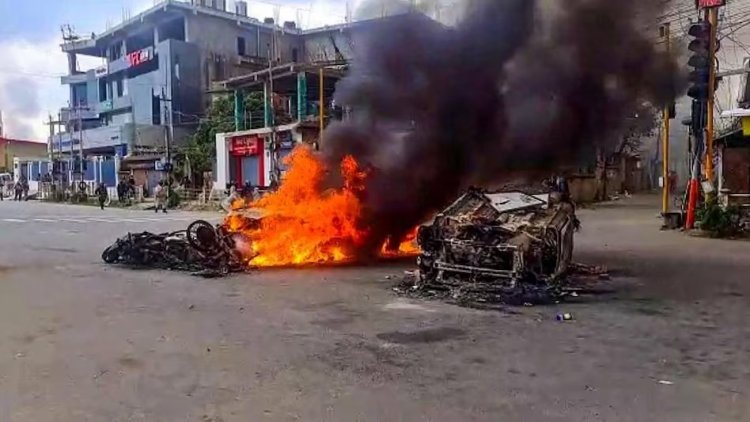Manipur: Situation Remains Serious
Asia News Agency

The situation in Manipur is not getting better. In fact, the ethnic conflict is worsening. Prime Minister Narendra Modi Thursday intervened for the first time stating the incident of two women being paraded naked in Manipur has shamed 140 crore Indians. He asserted that law will act with its full might and no guilty will be spared.
"My heart is full of pain and anger," he told reporters ahead of Parliament's Monsoon Session, amid criticism by Opposition parties for not speaking on the ethnic violence in the northeast state although 77 days have passed and over 150 people have been killed. "The law will act with its full might," the PM said.
Tension mounted in the hills of Manipur after a May 4 video surfaced Wednesday showing two women from one of the warring communities being paraded naked by a few men from the other side.
The government has meanwhile, asked Twitter and other social media platforms to take down a video of two Manipur women, since the matter is being probed.
Government agrees for discussions in parliament: In parliament the situation inn Manipur dominated the first day’s proceedings of the Monsoon Session which began Thursday, with the Opposition demanding the Centre discuss the issue. Under prerssure, Parliamentary Affairs Minister Prahlad Joshi informed members that the government is ready to have discussions on the Manipur violence in both Houses, and the Home Minister would give his reply once the discussions are conducted.
Congress for President's rule
The Congress Thursday slammed the Centre on the video, with party president Mallikarjun Kharge accusing the Modi government of turning democracy into “mobocracy". He said that "humanity has died in Manipur" and asked Prime Minister Narendra Modi to speak about the ethnic violence-hit state in Parliament and tell the nation what happened.
Senior Congress leader and former Union home minister P Chidambaram Friday said a ‘spell of President's rule is desirable’ in Manipur and asserted that there must be a neutral administration for enabling Meiteis and Kukis to stop the violence and talk to each other.
Supreme Court disturbed by the video
The Supreme Court Thursday also said it is “deeply disturbed” by the video of two women in Manipur.
Terming it "simply unacceptable", a bench headed by Chief Justice D Y Chandrachud directed the Centre and the state government to take immediate steps and apprise the apex court on what action has been taken.
"We will give a little time to the government to act otherwise we will take action if nothing is happening on the ground," the bench said.
The accountable factor
Avinash Paliwal (teaches at SOAS University of London and is the author of ‘My Enemy’s Enemy: India in Afghanistan from the Soviet Invasion to the US Withdrawal’) makes some important points in his analysis of the situation.
“Even the state administration stands partitioned. Meitei police officers don’t operate in the hills, and Kuki-Zo officers don’t operate in the Valley. To worsen matters, 6.32-lakh bullets and around 4,537-arms, including light and medium machine-guns, are reportedly missing from the Manipur Police Training Centre, 7th India Reserve Battalion, and 8th Manipur Rifles in Imphal city. Of these weapons, about 5.31 per cent are said to be in the Kuki-dominated hills, and the rest in the Meitei-dominated Imphal Valley. The fact that Meitei women’s groups scuttled an army operation and forced the release of 12 Kanglei Yawol Kanna Lup militants — with no follow-up action against either — brings into sharp relief the complicated gender politics and inter-community balance-of-power in this conflict.”
Roping Nagaland into the vortex: It is no secret, writes Paliwal “that the hill administration in southern Manipur is now being run from New Delhi, with the N Biren Singh government’s mandate reduced to the Imphal Valley. Even such limited writ came into question with the recent murder of a Naga woman in Imphal East, which threatened to dislocate Naga-Meitei ties……Such a situation risks roping Nagaland into the vortex, akin to the Meitei-Kuki rupture in the south that has already sucked Mizoram into the mix."
Mizoram government is openly supporting Kukis: Hosting thousands of displaced Kuki-Zo families, "the Mizoram government is openly supporting this community. Mizos feel the need to protect their ethnic kin in Manipur from Meitei majoritarianism. The last time this happened was in the 1970s and 1980s, when the Mizo National Front was an insurgent organisation seeking to unify all these communities into greater Mizoram. Political tensions between Mizoram, Assam and Manipur, including over disputed boundaries, have become highly charged. Couple this with massive infusion of drug profits and products from Myanmar, and it is anyone’s guess when and where the next fire could be lit.”
Fresh partitions: Essentially, writes Paliwal “we’re witnessing fresh partitions and associated armed ethnic mobilisation in Northeast India with support from states-within-the-Union. Such systems of violence, themselves a by-product of India’s majoritarian turn, are defined by competing desires for regional hegemony and demands for access to resources and power within the Union — not territorial separation. Socially corrosive, such ecosystems are lubricated by perverse electoral logics (after all, these communities become vote-banks for whoever advocates their cause, legitimate or otherwise), and illicit, unaccounted cash-flows, both of which are abundant in the Northeast.”
















